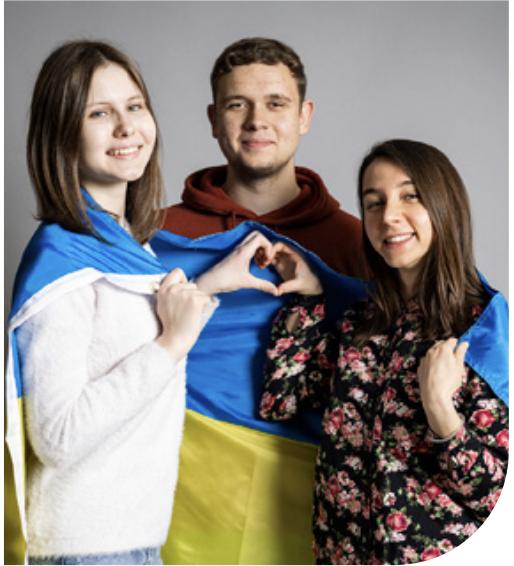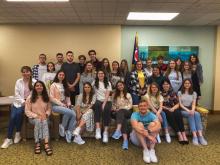Story by Carrie Bebris
In February 2022, Russia invaded Ukraine. The international governing body of the Seventh-day Adventist Church reached out to Adventist colleges in North America and Europe, asking if they could help displaced Ukrainian students whose educations were disrupted by the invasion.
Kettering College opened its doors (and hearts) to 34 Ukrainian students whose tuition, room and board, textbooks, and other expenses were paid in full by the generosity of the Kettering Health Foundation and individual donors.
In August 2022, students arrived in Kettering, Ohio, each with their own story of the life they knew, the difficulties they overcame to reach America, and the challenges of adjusting to life in a country different from their homeland. Here are two of their stories.
 Svitlana
Svitlana
Before the war, Svitlana Shnurenko, 23, was a student living with her parents in Bucha, a college town 12 miles from Kyiv, the Ukrainian capital. Though as a child she had dreamed of a career in medicine, as a young adult she set it aside to
study philology and project management.
In the early hours of Feb. 24, 2022, Svitlana woke to the terrifying noise of Russian planes dropping bombs. Her mother told her that the war had begun. “At that moment, I realized all the horror of the situation,” Svitlana says.
Her family had made an evacuation plan: They would travel to her grandfather’s house in Volyn, a region in western Ukraine about 240 miles away. “All the necessary things and documents were [packed] a week before,” she says.
But when news media reported Russia was bombing airports throughout the country—including the Hostomel military airbase just two miles from their house— they realized “there was no safe place in Ukraine.”
Svitlana, her mother, brother, and a friend squeezed into their small car with only
a few possessions. Her father, a pastor, stayed behind to evacuate students.
“It was the last time I hugged my dear daddy,” she says.
As Russian bombers soared overhead, Svitlana’s brother drove through a landscape engulfed in fire and smoke. They soon joined thousands of cars at a standstill on the road, their panicked drivers all trying to travel in the same direction—away from Kyiv.
They reached Volyn and faced more heart-wrenching goodbyes. In Ukraine, men 18 to 60 years old are not allowed to leave the country unless they’re studying at a foreign university. Otherwise, their duty is to defend Ukraine. “I will never forget that feeling of sadness when you understand that you may have hugged your brother and grandfather for the last time,” Svitlana says.
The women continued their journey. For months, they lived in the Czech Republic with extended family, applying for travel visas. They hoped to reach Toronto, where Svitlana’s sisters live.
“It was a difficult path—long lines and sleepless nights,” Svitlana says.
Meanwhile, they worried about her father. “My father risked his life to get people out of the most hostile and dangerous cities,” she says. “He was surrounded, and we lost contact with him for several days.”
Daniela
When Daniela Korchuk, now 18, was a young teenager, her father told her, “No matter which occupation you choose, the only thing that matters is to serve people. It’s all about God.”
As a college student at the Ukrainian Institute of Arts and Sciences in Bucha, she chose to study economics but never actually saw herself in that profession. “I didn’t know how I would be able to serve people,” she says.
When the invasion halted her studies, friends fleeing to western Ukraine invited Daniela and her mother to join them. At their destination, crowded into a small house with 15 people, they decided to continue west. By the time Daniela arrived at Kettering College with all the documents required to study here, her journey had taken her to Slovakia, the Czech Republic, the United States, Norway, and back to the U.S.
Meanwhile, loss of electricity and other war-related circumstances have caused her family to leave their home more than once. On one occasion, her father returned
to find one side of the house full of holes—shrapnel scars left from a rocket striking their neighbor’s house—and
his office ransacked by the Russians who had occupied another nearby home.
Svitlana says that when he could communicate again, “the first word he sent me was a message about Kettering College.”
He had learned about the opportunity, remembering her dream to be a doctor. “It was like a ray of hope,” she says.
Life at Kettering College
The students keep in touch with their families
though phone calls, texts, and video calls. Although communication gets disrupted by power outages in Ukraine, most days Svitlana and Daniela receive messages saying their families are OK.
As they adjust, they believe God’s plan led them here —to safety and the opportunity to train for a career in medicine. Svitlana, especially, has no doubt.
The Hand of God
Five years ago, long before the invasion, Svitlana was ill and asked God to show her His plan for her. That night, she dreamed about a room with a high bed. “I sat down on this high bed and read huge books in a not-native language for me,” Svitlana says, adding that she saw details “so vividly that I was able to draw them.”
The dream left Svitlana with more confusion than clarity— until she arrived at Kettering College and a staff member opened the door to her dorm room. “I couldn’t breathe,” she says. “From the high bed and white furniture to the mirror, wall colors, and wooden floor, I [saw] the same room from my dream.”
“As the war in Ukraine continues, we still worry about our parents,” Daniela says, “but God cares about them, and everything will be good with our families.”
Svitlana adds, “I like that God can turn evil—as in war—into something good, like the opportunity for us to be here and study.”
“And then,” Daniela says, “God can use us to help other people.”

